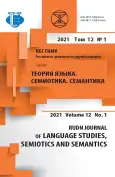Functional Category of Aspectuality in the Russian And English Languages
- Authors: Derdzakyan H.A.1
-
Affiliations:
- Yerevan State University of Languages and Social Sciences n.a. V.Ya. Brusov
- Issue: Vol 12, No 1 (2021)
- Pages: 41-60
- Section: FUNCTIONAL GRAMMAR & FUNCTIONAL SEMANTICS
- URL: https://journal-vniispk.ru/2313-2299/article/view/323393
- DOI: https://doi.org/10.22363/2313-2299-2021-12-1-41-60
- ID: 323393
Cite item
Full Text
Abstract
This article studies functional and semantic Tense/Aspect complexes in Russian and English, focusing on their similarities and differences. In Russian, Tense-Aspect meanings of the verb forms correlate with the semantic components of Aktionsart, while in English both Imperfective and Perfective aspects of the verb semantics are realized by the constituent category of Tense/Aspect. The inner asymmetry of the verb forms and meanings is acknowledged for each of the contrastive languages, especially for the two languages compared. The material of the study is retrieved from grammar books and manuals and from literary text samples, principally concerns the use of Tense/Aspect forms of the Russian verb and the forms of the English Perfect. The novelty impact of the study is determined by focusing on the irregularity of the aspectual meanings of English Perfect forms and Tense/Aspect forms of the Russian verb, whereas they are mostly due to lexical meanings of the verbs influenced by intralinguistic specificities of the semantics of lexical indicators as well as mechanisms of communication on the whole. Aspectual meanings both for the Perfective and Imperfective Aspect in languages under comparison used to make up lexical and grammatical aspectual categorical complexes. In terms of Aspect and Tense, peculiarities are found as functional and semantic ones, highly dependent on the situation and context of communication, thus involving extralinguistic factors which also concern the extralinguistic environment of Tense/Aspect verbal forms in use. The comparison of functions and the semantics of Aspect and Aktionsart in the Russian language with those of English Perfect asymmetry is proved to emerge, being caused by cross-linguistic structural and typological differences, particularly, the existence or not the similar forms, their varying semantic load, analytical or synthetic tendencies and others. The asymmetry is especially vividly seen translation and lexicographic field to compose varying kinds of bilingual dictionaries.
About the authors
Hripsime A. Derdzakyan
Yerevan State University of Languages and Social Sciences n.a. V.Ya. Brusov
Author for correspondence.
Email: d-ripsime@mail.ru
Candidate of Philology, Senior Lecturer of the General English Department, Russian and Foreign Languages Faculty
42, Tumanyan street, Yerevan, Republic of Armenia, 0002References
- Apresyan, Yu.D. (1995). Selected works: monograph. Vol. 1. Lexical semantics. Moscow: Shkola «Yazyki russkoj kul’tury». (In Russ.).
- Mel’chuk, I.A. (1998). A course of general morphology. Vol. II. Moscow—Vienna. (In Russ.).
- Bondarko, A.V. (1996). The problems of grammatical semantics and Russian aspectology. St. Petersburg: Izd-vo St. petersburgskogo universiteta. (In Russ.).
- Shelyakin, M.A. (1983). The category of aspect and kinds of action of the Russian verb. (Theoretical bases). Tallin. (In Russ.).
- Yakobson, R. (1985). On structure of the Russian verb In R. Yakobson. Selected works. Pod red. V.A. Zvegintseva. Moscow: Progress. 210—221. (In Russ.).
- Russian grammar: in 4 vols. (1980). Moscow: Nauka. Vol. 1. pp. 563—680. (In Russ.).
- Bulygina, T.V. & Shmelyov, A.D. (1989). Mental predicates in terms of aspectology. Logical analysis of language. The problems of intentional and pragmasemantic contexts. Editor-in-chief N.D. Arutyunova. Moscow: Nauka. pp. 22—26. (In Russ.).
- Maslov, Yu.S. (1959). Verbal aspect in contemporary bulgarian literary language. Meaning and use In Problems of grammar of bulgarian literary language. Moscow. pp. 157—312. (In Russ.).
- Isachenko, A.V. (1960). Grammatical system of the Russian language in comparison with Slovene. Morphology. Part. II. Bratislava. (In Russ.).
- Shakhmatov, A.A. (1941). Syntax of the Russian language. Leningrad. (In Russ.).
- Glovinskaya, M.Ya. (1982). Semantic types of the aspectual opposition of the Russian verb. Moscow: Nauka. (In Russ.).
- Maslov, Yu.S. (1984). Studies in aspectology. Leningrad: Nauka. (In Russ.).
- Bulygina, T.V. (1983). Predicate classes and the aspectual characteristics of utterance In Aspectual and temporal meanings in Slavic languages. Moscow: Nauka. pp. 15—19. (In Russ.).
- Kashpur, V.V., Fil’, Yu.V. & Shapoval, A.A. (2013). Aspectual characteristics of the Russian and English verb in language and text. On the material of M.A. Bulgakov’s novella «The heart of a dog». Tomsk State University Journal, 377, 22—29. (In Russ.).
- Comrie, B. (1976). Aspect. An Introduction to the study of verbal aspect and related problems. Cambridge: Cambridge University Press.
- Bondarko, A.V. & Shelyakin, M.A. (1987) Theory of functional grammar: Introduction. Aspectuality. Temporal localization. Taxis. Leningrad: Nauka. (In Russ.).
- Knyazev, Yu.P. (1983). The resultative, passive and perfect in the Russian language. The typology of the resultative constructions. Leningrad: Nauka. pp. 140—160. (In Russ.).
- The Encyclopedia of Language and Linguistics. (1994). New York, Seoul, Tokyo. Vol. 10. pp. 243—265.
- Ilyish, B.A. (1965). The system of the contemporary English language. (Theoretical course). Moscow: Leningrad: Prosveshcheniye. (In Russ.).
- Smirnitskij, A.I. (1970). Studies in comparative grammar of the Russian and English languages. Moskow: Vysshaya shkola. (In Russ.).
- Comrie, B. (1986). Tense. Cambridge, etc.: Cambridge Univ. Press.
- Dahl, Ö. (1989). Tense and Aspect Systems. Oxford.
- Goralek, K. (1979). Russian grammar: in 2 vols. Praha: ACADEMIA. Vol. 1. pp. 24—242.
- Shirokova, E.N. & Koshkarova, N.N. (2017). Tense-aspect meanings of English and Russian verb through linguodidactics and linguoculturology. Nizhegorod University after N.I. Lobachevski Journal, 5, 260—264. (In Russ.).
- Telin, N. & Nil’s, B. (1985). Aspect and kinds of actions in the Russian language In New in foreign linguistics. Vol. 15. Moscow. pp. 250—260. (In Russ.).
Supplementary files









